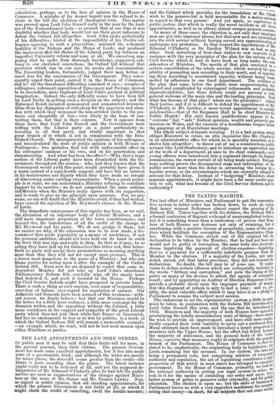THE LATE APPOINTMENTS AND SOME OTHERS. OF public men it
may be said that their faults tell for more, in the general account, than their virtues. The present Govern- ment has made some excellent appointments, but it has also made some of a questionable kind ; and although the latter are mostly for minor places, the discredit seems greater than the credit—the blame is more sounding than the praise. The latest instance ought really not to be reckoned at all, and yet the supposed de- linquencies of Mr. Edmund O'Flaherty after he had left the publics service are used as augmentatives of the charges against Minis- ters on the score of Mr. Stoner and Mr. Francis Lawley. Nay, so unjust is public opinion, that old standing appointments, for which the present Government is not liable at all, or which it might claim the credit of cancelling, swell the hostile account; and the Cabinet which provides for the translation of Mr. Choi. wick to the pension-list is held accountable for a malus animus in regard to that very person ! And yet again, so capricious je public justice, that which is really the worst incident in all the appointments, as well as in others, almost escapes general censer,. In many of these cases, the objection is, not only that improper men are put into improper places, but that new men are introduced into the civil service without having served any apprenticeship or undergone any probation. In that respect the appointment of Ms, Edmund O'Flaherty or Sir Eardley Wilmot was as bad as any other. Such intrusting of first-class duties to raw recruits is at variance with the very principles of the plan for the reform of the Civil Service which is said to have been so long under the ecs. sideration of Ministers. The merits of that plan consisted in a certain consolidation of the whole service, which secured the pos. sibility of promoting men according to their merit, and of appoint. ing them according to ascertained capacity, without being tram. melled by adherence to one fixed department. The outlines of the plan that came before the public were unquestionably dis. figured and complicated by extravagant refinements and pedantic impracticabilities; but those defects could not prevent a very general welcome of the main idea and the leading principles. Now what has become of that plan ? where are the principles ? Admit their justice, and if it is difficult to defend the appointment of Ms O'Flaherty or Mr. Lawley, a more recent appointment is equally indefensible—that of Sir Benjamin Hall to be chief Minister for Public Health! His only known qualifications appear to he " extreme " but " safe" Radical opinions, wealth and princely pre. tensions in Wales, and the exercise of a troublesome tongue below the gangway or at Marylebone meetings. The-whole subject demands revising. It is a bad system which obliges Ministers to retain an able inquisitor like Mr. Chadwick in an administrative office for which he is specially unsuited, or to shelve him altogether ; to throw out of use a conscientious public servant like Lord Shaftesbury, and to introduce an apprentice, raw at the work of a department, at once to its chief command,--as if young officers were introduced into a regiment through its highest commissions, the rawest recruit of all being made colonel. But per. haps nothing proves the disorganized state and indiscipline of the public service more than the delay in advancing the reform by a regular course, or the circumstances which are currently alleged to account for that delay. Instead of " badgering" Ministers about separate appointments, it might have been a far more useful ques- tion to ask, what has become of the Civil Service Reform and its authorship


























 Previous page
Previous page